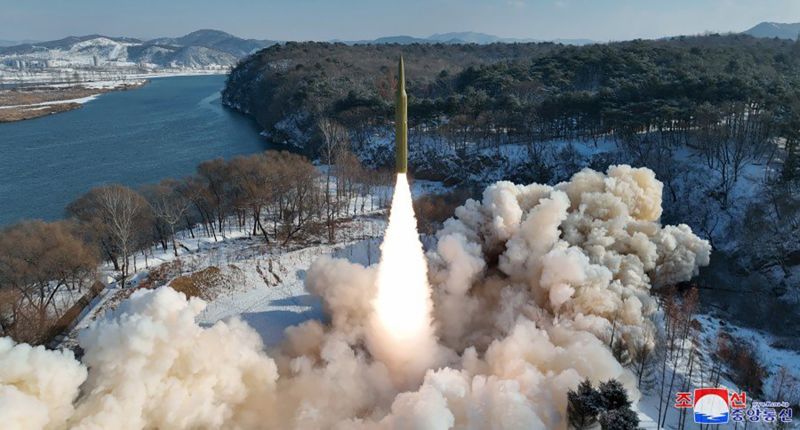
North Korea Claims Successful Test of Hypersonic Missile

North Korea has claimed to have successfully tested a hypersonic missile that could change the military equation in the region. The missile, with the potential to be fitted with a nuclear warhead, marks a significant advancement in North Korean technology.
North Korea's Hypersonic Missile Test
North Korea's recent claim of a successful hypersonic missile test has raised international concerns and sparked new fears about the country's military capabilities. The state-run Korean Central News Agency (KCNA) reported that Kim Jong Un's regime successfully tested a hypersonic glide vehicle using solid-fueled engines. This marks the fourth such test claimed by Pyongyang and the first with a potentially game-changing method of propulsion. The test aimed at verifying the gliding and maneuvering characteristics of an intermediate-range hypersonic maneuverable controlled warhead and the reliability of newly developed multi-stage high-thrust solid-fuel engines.
North Korea claims a successful solid-fuel intermediate-range ballistic missile (IRBM), equipped with a hypersonic maneuvering combat unit, was conducted.
South Korea's Joint Chiefs of Staff (JCS) confirmed that the missile flew about 1,000 kilometers before landing in the waters off the east coast of the Korean Peninsula on Sunday afternoon. The JCS described the launch as a clear provocation that seriously threatens the peace and security of the Korean Peninsula. Experts have expressed concerns about the potential capabilities of hypersonic glide vehicles, which can theoretically fly at many multiples of the speed of sound and be very maneuverable in flight, making them almost impossible to shoot down.
North Korea's first hypersonic missile test was conducted on September 28, 2021, followed by two further tests in early January 2022. However, the recent test showed a significant technological advancement, as North Korea claimed to have used solid fuel for the first time. This development has raised concerns among experts about the stability and mobility of solid-fueled missiles, as they can be moved more easily to avoid detection and launched on short notice. If North Korea can successfully produce and deploy a hypersonic weapon, it could change the military equation in the region.
Implications of North Korea's Hypersonic Missile
The successful testing of a hypersonic missile by North Korea has raised concerns about its potential impact on regional and international security. Analysts have noted that if North Korea can develop and deploy a hypersonic weapon, it could pose a significant challenge to missile defenses of US bases and allies. The maneuverable warheads and solid-fuel missiles could make it difficult to defend against North Korean attacks. This advancement in North Korean missile technology has prompted experts to reassess the effectiveness of existing missile defense systems in the region.
The use of solid-fueled engines in the recent test has also drawn attention, as it represents a shift from previous tests using liquid fuel. Solid-fueled missiles are considered more stable and easier to move, making them harder to detect and providing the ability to launch on short notice. This development has raised concerns about the potential for North Korea to evade missile defenses and launch surprise attacks. Moreover, if North Korea can successfully produce and deploy hypersonic weapons, it could alter the strategic balance in the region, posing new challenges for US and allied forces.
International Response and Concerns
The international community has expressed growing concerns about the proliferation of hypersonic missile technology and its implications for global security. The deployment of hypersonic missiles by North Korea, along with similar capabilities in China and Russia, has raised fears of an arms race and increased tensions in the region. The potential for hypersonic weapons to evade existing missile defenses and strike with high precision has prompted a reassessment of defense strategies and capabilities. Additionally, the recent use of North Korean missiles in Ukraine has heightened international concerns about the spread of advanced missile technology and its potential impact on conflicts around the world.
The collaboration between North Korea and Russia, as evidenced by the use of North Korean-supplied missiles in Ukraine, has underscored the need for greater vigilance and cooperation in addressing the proliferation of advanced weapons. The international community is closely monitoring the developments in North Korea and the implications of its hypersonic missile testing. The use of hypersonic weapons has raised new challenges for global security and the effectiveness of existing defense systems, prompting a reevaluation of defense strategies and cooperation among nations.














